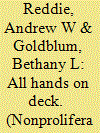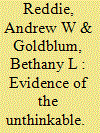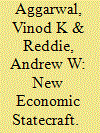|
|
|
Sort Order |
|
|
|
Items / Page
|
|
|
|
|
|
|
| Srl | Item |
| 1 |
ID:
160990


|
|
|
|
|
| Summary/Abstract |
With the continued use of unsafeguarded naval nuclear-propulsion programs in all nuclear-weapon states, the commissioning of an Indian nuclear submarine, and the potential investment in such programs by non-nuclear-weapon states including Brazil and South Korea, movement toward a regulatory regime for nuclear material in the naval sector has become imperative. Such a framework faces a recurring debate on adequately protecting sensitive military technology while delivering assurances that naval nuclear material is not diverted to nuclear-weapon programs. In this viewpoint, we examine various prospective mechanisms to regulate naval nuclear stocks and assess them in terms of their effectiveness and scope. Drawing on lessons from the drafting, negotiation, and implementation of the Model Additional Protocol, we recommend a safeguards regime for naval nuclear material via a protocol that supplements the existing global nuclear-governance system. This protocol provides a standardized yet flexible approach to naval nuclear-material safeguards across all states (whether nuclear-weapon states, non-nuclear-weapon states, or outside the Treaty on the Non-Proliferation of Nuclear Weapons) to handle variations among naval nuclear fuel cycles and technologies.
|
|
|
|
|
|
|
|
|
|
|
|
|
|
|
|
| 2 |
ID:
192872


|
|
|
|
|
| Summary/Abstract |
Ongoing nuclear modernization programs in Russia, China, and the USA have reopened longstanding debates among scholars concerning whether tailored nuclear weapons are likely to have destabilizing consequences for international security. Without data to adjudicate this debate, however, these discussions have remained entirely theoretical. In this article, we introduce an experimental wargaming platform, SIGNAL, to quantify the effect of tailored nuclear capabilities on the nuclear threshold in a simulated environment. We then compare these results with a survey experiment using scenarios related to military basing, cyber operations, and nuclear threats from the wargame environment. While the survey experiments suggest that the presence of tailored nuclear capabilities increases the likelihood of conflict escalation, this trend diminishes in the wargaming context. Across both data-generating processes, we find support for the proposition that lower-yield nuclear weapons are used as a substitute for their higher-yield counterparts. These results have consequences for recent and ongoing policy debates concerning strategic posture and the future of arms control. This work also makes methodological contributions to the design and application of experimental wargaming for social science research, particularly for scenarios where data are limited or non-existent.
|
|
|
|
|
|
|
|
|
|
|
|
|
|
|
|
| 3 |
ID:
173189


|
|
|
|
|
| Summary/Abstract |
The 2018 U.S. National Defense Strategy notes that the United States faces “an increasingly complex global security environment, characterized by overt challenges to the free and open international order and the re-emergence of long-term, strategic competition between nations.” In the ensuing months, much has been made of the security-related aspects of this return to great power competition — including Donald Trump’s role in the decline of the existing arms control architecture, responses to Russia’s annexation of Ukraine, and China’s use of subconventional — or “gray zone” — military operations in the South China Sea. What this analysis tends to miss, however, are the economic dimensions of strategic competition. To address the question of how insights from international political economy and security studies can be usefully combined to examine strategic competition, we examine how economic statecraft increasingly takes the form of economic policy beyond sanctions regimes. We argue that economic statecraft has become an increasingly central aspect of geostrategic consideration and consider how economic statecraft is being transformed in the current era.
|
|
|
|
|
|
|
|
|
|
|
|
|
|
|
|
|
|
|
|
|